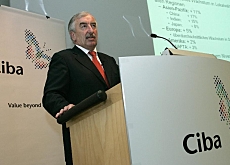Raw materials costs corrode chemical industry

Rising raw material and energy costs - coupled with shrinking demand - have taken their toll on the financial performance of Swiss chemical firms Ciba and Clariant.
But while global competitors have experienced the same difficulties, the Basel-based duo have also been stung by the strong Swiss franc and strategic problems, according to analysts.
Both companies operate in a competitive market producing chemicals, such as dyes and pigments, for the car, plastics, paper, construction and textile industries.
Ciba shares plummeted on Tuesday after the company announced a first-half net loss of SFr569 million ($520 million) compared with a SFr103 million profit in the corresponding period in 2007.
Profits were dented by a SFr595 million write down at its water and paper treatment unit. The company is in the process of slashing 2,500 jobs, announced two years ago, and recently hinted that it may sell off unprofitable businesses.
Clariant managed to post a SFr92 million first-half net profit in July (SFr73 million in 2007), but warned of difficult times ahead as demand dries up and production costs increase in the next few months.
The company said in 2006 that it would shed ten per cent of its workforce (2,200 jobs) and reduce factory capacity. As part of this programme, the firm shed 750 jobs earlier in the year and announced the impending closure of a British based factory last month.
Strategic U-turn
Both companies are particularly susceptible to price changes in raw materials and energy costs, but the strengthening of the Swiss franc against the dollar this year has also disadvantaged them.
“If you are producing in Europe and transferring your products to the US then you have a huge cost disadvantage,” Zurich Cantonal bank analyst Martin Schreiber told swissinfo.
Schreiber added that US competitors had been quicker to adjust their strategies to pass on rising costs to customers and reduce output capacity.
“They both followed the wrong strategy of focusing on volume growth rather than price increases, but they are now both changing. Clariant introduced this strategy six or 12 months before Ciba, allowing them to increase prices six per cent in the second quarter.
“The climate is now very good for price increases because customers know that raw material prices are increasing,” he said.
Ciba struggling
Schreiber believes Clariant has the edge over its rival as both companies battle to boost financial figures and share prices.
“Market share is not a key point, but to maintain profitability in the near future. Clariant is in a healthier position, it has more strategic options and a stronger balance sheet to reposition itself in the market,” he said.
Other analysts are more wary about Ciba’s future prospects. “Ciba is in a tough situation. [It] is taking corrective restructuring measures so as to restore both profitability and sustainable value creation, but the turnaround will take time,” said Vontobel analyst Damien Weyermann.
swissinfo, Matthew Allen
Basel-based Clariant is a global leader in the field of fine and specialty chemicals.
It produces dyes, pigments, functional chemicals, additives and masterbatches for the textile, paper, leather, plastics, synthetic fibres and paint industries.
The company has a strong heritage going back to the 1850s, with roots in both Sandoz and Hoechst Specialty Chemicals.
In 2006, it announced that 2,200 jobs would be lost while factory production would be cut by 10% and the number of products would be reduced by a quarter. The measures were part of a four-year restructuring programme that had started two years earlier.
Ciba is one of three companies created by the merger of Ciba-Geigy and Sandoz in 1996, along with Novartis and Syngenta. It was initially called Ciba Specialty Chemicals, but shortened its name last year.
The Basel-based group supplies dyes and pigments to textile, car, cosmetic, plastics, paper and construction industries.
The company said in 2006 that it would slash 2,500 jobs – the group’s fourth cost-cutting exercise in five years. On January 1 of this year, Armin Meyer stepped down as chief executive but remained as group chairman.

In compliance with the JTI standards
More: SWI swissinfo.ch certified by the Journalism Trust Initiative












You can find an overview of ongoing debates with our journalists here . Please join us!
If you want to start a conversation about a topic raised in this article or want to report factual errors, email us at english@swissinfo.ch.